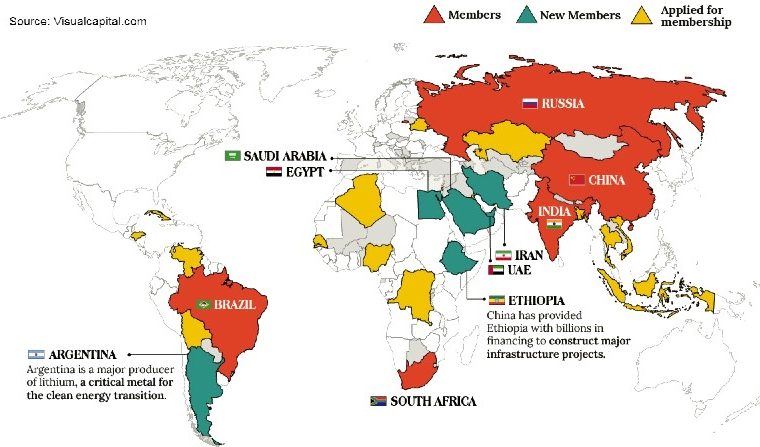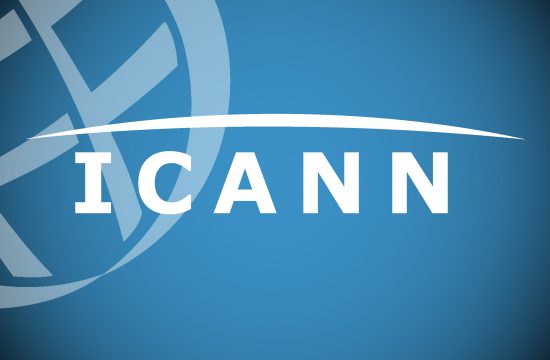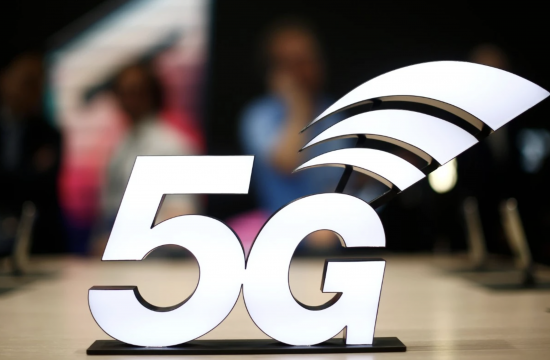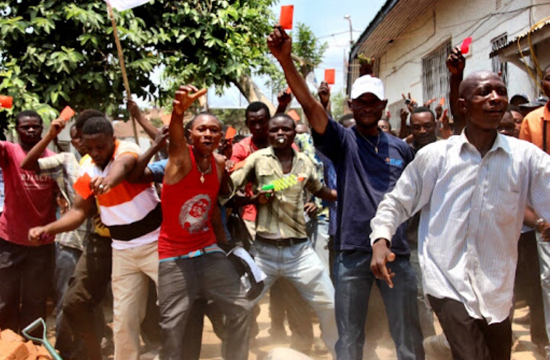By Pooran Chandra Pandey
The BRICS bloc of leading emerging economies took a major decision in expanding its reach and influence with the announcement made that six more countries- Argentina, Egypt, Ethiopia, Iran, Saudi Arabia, and the United Arab Emirates – have been invited to join as new BRICS members taking the total number of nations within the grouping to 11, effective January 1, 2024.
The bloc initially formed in 2009 with Brazil, Russia, India, and China, first expanded in 2010 to admit South Africa. The bloc after 23 years of its existence has now sought to grow a stronger coalition of developing nations that can better put the interests of the Global South on the world map. Before the start of its annual summit in Jo Berg, South Africa during August 23-24, more than 40 countries had expressed interest in joining BRICS, with 23 formally applying to join it.
“We appreciate the considerable interest shown by countries of the Global South in membership of BRICS,” the bloc said in the Johannesburg II declaration it adopted on the final day of the Summit on August 24. The statement further added that the six new nations were selected after “BRICS countries reached consensus on the guiding principles, standards, criteria and procedures of the BRICS expansion process. Some analysts have however highlighted that it is hard to find commonalities among the six countries invited to join BRICS other than that they are each significant nation-states in their region.
Expansion of the BRICS has clear geo-economic, geostrategic, and geopolitical implications as the latest additions of nations will push some BRICS nations to think more about their geo-spatial policies, and for China and India to beef up the existing policies. It may be recalled that China recently brokered the re-establishment of ties between Saudi Arabia and Iran, a role that would traditionally have been filled by a country like the United States.
On the other hand, India recently signed an agreement with the UAE to trade in Indian rupees and Emirati dirhams instead of in the US dollar. The use of instruments by Western nations as unilateral economic and trade sanctions against countries such as Russia as a result of the war in Ukraine and the continued dominance of the US dollar in global trade is what BRICS has vocally challenged.
This shift could increase the potential for using currencies other than the US dollar, particularly by creating a network of countries that enhances the utility of their respective currencies. Argentina for instance, has been touted as a “shoe-in” as its inclusion was championed by Brazil, China and India.
Among the African states, it was expected that Algeria, which has oil reserves, or Nigeria, which is the continent’s most populous country and leading economy, could have been given a berth in the new membership of the bloc. Nigeria’s exclusion appears to be an indictment of its foreign policy or the lack of it as it used to be pan-African in its foreign policy but over time seems to have changed.
One thing that is very clear is that the rest of Africa – with the potential exception of Nigeria and Kenya – is moving away from the West and towards the East. The inclusion of Ethiopia, a country with one of the fastest-growing economies, that also hosts the headquarters of the African Union has firmly put the African continent front and center with economic benefits widely seen to be accruing to the continent over time.
Egypt, Saudi Arabia, and the UAE are similar to India and, to some degree, South Africa, in that “these are countries that have one foot in BRICS and another foot in the West with Saudi Arabia, “positioning” itself it is not just in the American camp. However, It remains to be watched out for what an expanded BRICS means to the West and what it denotes for the current global order and governance.
With the additions of six more nations, the bloc now represents a larger share of the world’s population and economy. However, this only means that the group is potentially a powerful voice for reform of the arrangements for global governance and a powerful actor in these mechanisms.
Whether it actually becomes such a voice will depend on whether the expanded group is more effective than the BRICS itself in its original format in forging agreements on how the arrangements for global governance should be reformed and how they can more effectively serve the interests of the whole of the Global South, the answer to which would lie in years to come as mix and match between and among 11 member nations evolves and develops.
The expanded BRICS assumes greater significance due to the inclusion of nations from Africa as a starting point given that there is now a firm recognition among the comity of nations about the important role that the African continent would play not just for the global order and governance but for the growth and development of the global economy.
With most nations in the Global North either slowing down economically or getting stuck in geopolitical crosswire, the African continent emerges as a singular most important region that despite its challenges shows signs of resilience and its growth prospects to be able to offer a new ray of hope for the international community.
It may also be recalled that initial BRICS members have been a part of the G20 grouping which is currently being chaired by India with the presidency rotating to Brazil for the year 2024, the expansion mechanism is bound to elevate India’s advocacy for Africa’s inclusion into G20 to further strengthen the voice of the Global South in sharpening focus on reforms of multilateral institutions such as IMF and the World Bank including the UN system and mechanism itself.
Banking systems that the BRICS block initiated and successfully implemented with the National Development Bank in Shanghai and AIIB in Beijing firmly put the focus on development financing which the developing economies always faced when challenged with liquidity issues for their infrastructure projects and structural planning purposes. India and China both hold a sizeable equity in development-oriented banks and have successfully funded infrastructure projects in developing economies, the results of which are quite visible in setting the development trajectory of nations in the Global South that remained behind due to the lack of development financing.
The issue of global food security puts the focus front and center on Africa. It is a continent with arable land of 350 million hectares that is using just 10 million hectares due to the lack of technical support and lack of access to fiancés but could well become the bread basket for the world. Fast-paced technological development of products and services at lower rates and an emerging informal economy are leading the African continent on the pathway to a mini-revolution of sorts with the youth population from Africa driving digital innovation.
The inclusion of MENA region in the BRICS expansion is a powerful message to the Global North about the shape of things to come in the future where development, governance, technology, and innovation would be the driving themes. Over time, with G20 expansion on the agenda and the inclusion of Africa through the Africa Union, the continent is slated to play a more dominant and decisive role in reshaping global growth and development for shared prosperity for the international community.
While Africa’s role will be getting increasingly more vital on the world stage as a solution provider, it would need to safeguard itself from falling into conflicts, debt traps, and territorial disputes that could potentially hinder its march towards growth, prosperity, stability, and peaceful co-existence. It is widely anticipated that Africa’s role in regional and global geo-economics and stabilization processes will hold the ground for the rest of the period in the lead-up to the end of the 21st century.










